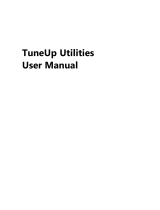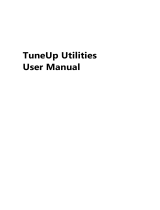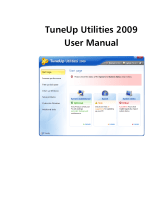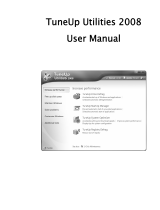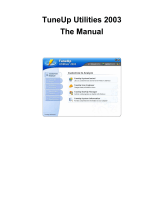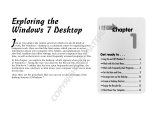Page is loading ...

TuneUp Utilities
User Manual

Microsoft, Windows, Windows XP, Windows Vista, Windows 7, Windows 8, Office, Outlook, Windows Logo, MSN, Windows Messenger and Internet Explorer are prod-
ucts, registered trademarks or protected names of Microsoft Corporation in the USA and/or in other countries. Firefox is a product and registered trademark of the
Mozilla Foundation in the USA and/or other countries. Safari is a product and registered trademark of Apple Inc. in the USA and/or other countries. Opera is a prod-
uct and a trademark of Opera Software ASA. Other products and brand names can be products and/or brands of their respective owners.
Please note that the pictures in this manual may differ from the actual software.

Table of Contents
1. Welcome to TuneUp Utilities 2013! 5
New features in TuneUp Utilities 2013 6
System Requirements 7
Help & Support 7
2. The Start Center 8
Changing TuneUp Utilities Settings 11
Turbo Mode 16
Economy Mode 22
The Optimization Status 27
3. Status & Recommendations 29
1-Click Maintenance and Automatic Maintenance 31
Increasing Performance 35
Fixing Problems - Details 38
Undoing Changes 39
4. Optimizing Your Computer 42
Disabling Programs 43
Disabling Startup Programs 47
Displaying and Uninstalling Programs 51
Configuring Live Optimization 54
Cleaning the Registry 57
Defragmenting the Registry 64
Remove Broken Shortcuts 67
Optimizing System Startup and Shutdown 69
Defragmenting the Hard Disk 72
5. Cleaning Up Your Computer 76
Cleaning Up Windows and Programs 78
Finding and Deleting Large Amounts of Data 83
Securely Deleting Data 90
6. Fixing Problems 93
Fixing common problems 93

Checking the Hard Disk for Errors 95
Displaying and Closing Running Processes 98
Restoring Deleted Files 101
Showing System Information 105
7. Customizing Windows 107
Personalizing Options and Behaviors 108
Personalizing the Appearance of Windows 133
8. Overview of All Functions 150
Editing the Registry 154
Check for Updates 156
Showing the TuneUp Optimization Report 158
9. Rating Function for Programs 159
10. The TuneUp Utilities Gadget 161
11. TuneUp Utilities in Taskbar Notification Area 162
12. Index 163

1. Welcome to TuneUp Utilities 2013!
Congratulations on choosing TuneUp Utilities! You have just acquired a comprehensive collection of over 30 dif-
ferent tools to optimize your PC. Use this software to revitalize PCs, notebooks or netbooks with a minimum of
effort!
With TuneUp Utilities, you can restore the full performance capabilities of your operating system, games and
programs. TuneUp Utilities can also automatically run important maintenance tasks, such as cleaning up your
hard disk and registry for you, or you can run them yourself manually. A slow and untidy computer is now a
thing of the past for you. TuneUp Utilities recognizes whether there are any problems on your system and offers
simple solutions. You can also use TuneUp Utilities to customize the appearance of your Windows system to
your personal requirements.
This version’s new feature is the TuneUp Disk Cleaner. It will not only remove program remnants from your hard
disk, but will also help you to clean up more than 25 Windows functions. So you get even more out of your PC!
The cleanup is completed by the new TuneUp Browser Cleaner, which protects your privacy by reliably remov-
ing traces of your surfing activity.
We hope you enjoy using TuneUp Utilities and your new, revitalized PC!
The TuneUp Team
TuneUp Utilities Manual 5

New features in TuneUp Utilities 2013
With TuneUp Utilities, you can make sure your PC, notebook or netbook is in the best of health - all without any
expensive upgrades! Below is an overview of the most important new features in this version:
The Innovative TuneUpDisk Cleaner
Are program remnants and files accumulating on your hard disk? The new TuneUp Disk Cleaner function pro-
vides you with expert help, clearing your computer of these remnants.
The Thorough TuneUp Browser Cleaner
TuneUp Browser Cleaner allows you to completely clear out many different areas of your browser. It uncovers
and cleans up numerous traces of your surfing activity, including the cache, cookies and downloads.
The Even More Powerful TuneUp Registry Cleaner
For an even more thorough cleanup, the new and improved TuneUp Registry Cleaner now scans and cleans up
even more areas of the Windows registry.
The Improved TuneUp Shortcut Cleaner
The optimized TuneUp Shortcut Cleaner now removes broken shortcuts and history lists of programs from the
hard disk even more efficiently.
The Even More Effective TuneUp Live Optimization
The new TuneUp Live Optimization is now even more intelligent and learns with you. It detects frequently dep-
rioritized programs and gives you the option to disable them.
Windows 8 Support
TuneUp Utilities now runs in Microsoft’s brand new Windows 8.
TuneUp Utilities Manual 6

System Requirements
To be able to install and run TuneUp Utilities, your computer must meet the following requirements. These
requirements aren't high - most computers used today have these features:
l Windows® XP (Service Pack 3 or higher), Windows® Vista, Windows® 7 or Windows® 8 (all 32-bit or
64-bit versions)
l Min. 300 MHz processor
l 256 MB RAM
l Screen resolution at least 1024x600 pixels
l Online version: at least 150 MB of free disk space
l CD version: at least 400 MB of free disk space (and CD-ROM or DVD drive)
l Internet Explorer 6 or higher
If you have bought the CD version of TuneUp Utilities, but your netbook doesn't have a CD-ROM drive, you can
download our trial version from www.tune-up.com and activate it using the product key given on the CD case.
Help & Support
TuneUp Utilities has been designed to be as user-friendly and intuitive as possible. This manual provides you
with an overview of TuneUp Utilities. Taking the layout of the Start Center as a guide, it explains what the many
different functions do and how to access and use them.
Online at www.tune-up.com/support, you will find more information, tips & tricks, the Program Help in PDF
format with lots of additional pictures, frequently asked questions about TuneUp Utilities and TuneUp Support.
You can reach TuneUp Support by calling +1 312 9629996 (Mon - Fri, 9 a.m. - 7 p.m. CST) or via the TuneUp Sup-
port website. It will help support staff greatly if you know your TuneUp Utilities version number. You can find
this by going to the Help & Support menu in the Start Center and selecting About.
TuneUp Utilities customers who have registered with us also receive comprehensive support beyond the scope
of the statutory warranty for 12 months from the date of activation with the product key. You are therefore
asked to indicate your product key which you used to activate TuneUp Utilities when sending a support inquiry
after the trial period has expired.
TuneUp Utilities Manual 7

2. The Start Center
The new TuneUp Utilities Start Center is the central access point for all functions and optimization options.
The five categories
The main area in the TuneUp Utilities Start Center comprises five categories, giving you fast access to the key
features of TuneUp Utilities sorted by topic.
Status & Recommendations
The Status & recommendations category shows you an overview of the current condition of your system and
gives you recommendations on how you can improve the system's health. On the far right, you can see the
status of your system protection.
(For more information, see Status & Recommendations, p. 29.)
Optimizing Your Computer
Under Optimize Computer, you can disable or uninstall unwanted programs and clean up your system and your
data.
(For more information, see Optimizing Your Computer, p. 42.)
Cleaning Up Your Computer
Under Clean Up Computer, you can delete unnecessary data and traces of use from your system systematically.
(For more information, see Cleaning Up Your Computer, p. 76.)
Fixing Problems
Under Fix problems, you will find simple solutions for any problems that might occur.
(For more information, see Fixing Problems, p. 93.)
Customizing Windows
Under Customize Windows, you have many opportunities to customize your working environment to suit you.
(For more information, see Customizing Windows, p. 107.)
TuneUp Utilities Manual 8

Overview of All Functions
To the right of the categories, you will see the Overview of all functions. This lists all the functions that are avail-
able in TuneUp Utilities - clearly sorted by application area.
The three PC optimization modes
In the PC optimization mode area, you can decide which mode should be turned on for your Windows oper-
ating system. There are three switches here: one for Economy Mode, one for Standard Mode and one for Turbo
Mode. Click the relevant switch to turn a mode on. Following installation, Standard Mode is turned on by
default.
Economy Mode
You can use TuneUp Economy Mode at any time to save energy on your computer and reduce your electricity
costs.
TuneUp Economy Mode is an intelligent module of TuneUp Utilities for saving energy. TuneUp Economy
Mode provides immediate energy saving whenever you need it. When you switch your computer to Economy
Mode, it reduces the energy used by hardware and the tasks, programs and features that are running in the back-
ground and not strictly necessary. They are turned off, which can reduce energy consumption considerably.
For more information about this, see Economy Mode, p. 22
Standard Mode
In Standard Mode all functions of TuneUp Utilities are available without restriction.
Turbo Mode
You can use TuneUp Turbo Mode to give your system an additional performance boost at any time and adjust it
to suit you.
TuneUp Turbo Modeprovides an immediate performance boost whenever you need it. When you put your com-
puter into Turbo Mode, an analysis is performed to see which of those programs and functions currently run-
ning in the background are not strictly necessary. These programs are stopped or slowed down, allowing the
additional processing power gained to be used exclusively by the programs you are actually running.
For more information about this, see Turbo Mode, p. 16
Optimization Status
The Optimization Status is your personal indicator of optimization progress, i.e. it shows you how well you are
already using TuneUp Utilities and where there is still potential to optimize your system further. The Opti-
mization Status shows you details of both the Completed optimizations and the potential you have exploited.
The Optimization Status also helps you to recognize the remaining Unused potential and make use of it.
TuneUp Utilities Manual 9

The Menu Bar
In the menu bar, you have access to the central settings dialog of TuneUp Utilities and to information about the
program and individual modules.
The "Settings" Menu
Clicking on Settings takes you to the central configuration dialog of TuneUp Utilities. Here you can adapt the
program to your requirements, apply maintenance settings and configure TuneUp Live Optimization, TuneUp
Turbo Mode, the update check and many other modules of TuneUp Utilities (for more information, see Chang-
ing TuneUp Utilities Settings, p. 11).
The "Help & Support" Menu
The Help & Support menu provides you with access to the extensive program help with detailed instructions
and program information. You can also click the link there and go to the TuneUp website directly. Clicking on
Check for updates starts the TuneUp Update Wizard module, which checks whether there are any new updates
for your TuneUp Utilities.
If you are using a trial version of TuneUp Utilities and already have a product key, click here on Activate prod-
uct and enter your product key. It is worthwhile activating TuneUp Utilities, because customers who have reg-
istered with us receive comprehensive support beyond the scope of the guarantee for 12 months from the date
of activation. If you do not yet have a product key, you can click Buy product to go directly to the TuneUp Shop
website and buy a full version.
If you want to register your product, click Register product after you have successfully activated it. Enter your
name and your e-mail address.
TuneUp Utilities Manual 10

Changing TuneUp Utilities Settings
The following chapters explain how you can adapt important settings and TuneUp Utilities modules to suit your
needs.
Introduction
The central settings dialog of TuneUp Utilities contains a convenient list of the most important settings and
modules of TuneUp Utilities and their associated configuration options.
You can use the settings dialog to specify, among other things, how TuneUp Utilities is integrated into your
Windows operating system, which notifications should be displayed automatically and whether TuneUp Util-
ities should automatically check for updates.
In addition, you can configure the various modules, such as Live Optimization and Automatic Maintenance
and change the settings for Turbo Mode and Program Deactivator.
TuneUp Utilities Manual 11

How to Configure your TuneUp Utilities
There is a menu bar at the top right of the Start Center. Clicking on Settings opens the central TuneUp Utilities
settings dialog, which contains a list of the key settings for TuneUp Utilities and their configuration options -
conveniently sorted by area.
Alternatively, you can open the settings dialog by going to Overview of all functions in the Start Center and
selecting the Settings entry under TuneUp Utilities.
Integration
Here you can specify which desktop icons and context menu entries for TuneUp Utilities should be displayed
and whether the Windows Task Manager should be replaced with the TuneUp Process Manager.
Notification area icon
Here you can specify when you want to be informed by the TuneUp Utilities icon in the notification area of the
taskbar.
Notifications
Here you can specify when notifications about TuneUp Program Deactivator™ and maintenance measures
should be displayed.
If the notification that appears once automatic maintenance is complete disturbs you, you can switch it off here.
Remove the tick from next to Notify me when Automatic Maintenance is complete.
Updates
Here you can specify when and whetherTuneUp Utilities should automatically search for available updates and
inform you about them.
For more information about this, see How to Check for Updates, p. 156
Rescue Center Protection
Here you can specify which modules should be protected by TuneUp Rescue Center, so that changes can be
easily undone.
For more information about this, see How to Undo Changes, p. 39
TuneUp Utilities Manual 12

Password protection
Here you can specify whether password protection should be enabled for TuneUp Utilities to protect your
TuneUp Utilities from being used by unauthorized users. You need to set your personal password for this.
You also have the option of setting a password hint.
TuneUp Utilities Manual 13

How to Configure TuneUp Utilities Modules
In this area of the central settings dialog, you can change the settings for the various modules of TuneUp Util-
ities. Click on a module name on the left of the navigation bar to open the page for the module concerned.
You can configure the following TuneUp Utilities modules here:
Live Optimization
In this area, you can change the settings for Live Optimization.
For more information about this, see How to Configure Live Optimization, p. 55
1-Click Maintenance
In this area, you can change the settings for 1-Click Maintenance.
For more information about this, see How to Change Maintenance Settings, p. 33
Automatic Maintenance
In this area, you can change the settings for Automatic Maintenance.
For more information about this, see How to Change Maintenance Settings, p. 33
Economy Mode
In this area, you can change the settings for Economy Mode.
For more information about this, see How to Configure Your Own TuneUp Economy Mode, p. 24
Turbo Mode
In this area, you can change the settings for Turbo Mode.
For more information about this, see How to Configure Your Own TuneUp Turbo Mode, p. 19
Disk Space Explorer
In this area, you can change the settings for Disk Space Explorer.
For more information about this, see How to Configure TuneUp Disk Space Explorer, p. 87
TuneUp Utilities Manual 14

Program Deactivator
Here you can make various settings for TuneUp Program Deactivator™.
Specify whether programs that have been re-enabled by starting them manually should be automatically dis-
abled again after they are closed. You can also specify for programs that are scheduled to be disabled the time at
which this should happen.
For more information about TuneUp Program Deactivator™, see Disabling Programs, p. 43
TuneUp Utilities Manual 15

Turbo Mode
In the following chapters, you will find out when it can be useful to do so and what exactly happens when you
turn on the TuneUp Turbo Mode. On top of that, you will receive instructions on how to switch on and con-
figure TuneUp Turbo Mode.
Introduction
TuneUp Turbo Mode provides an immediate performance boost whenever you need it. When you put your com-
puter into Turbo Mode, an analysis is performed to see which of those programs and functions currently run-
ning in the background are not strictly necessary. These programs are stopped or slowed down, allowing the
additional processing power gained to be used exclusively by the programs you are actually running.
When should I switch on Turbo Mode?
Using the Turbo Mode can, for example, speed up computer games, make it easier to work with performance-
sapping programs or prevent videos from flickering or freezing when they are played. Note however that when
you enable Turbo Mode, you also turn off some functionalities that will not be available again until you turn off
Turbo Mode.
How Does Turbo Mode Work?
The following graphics illustrate the internal workings of your PC with the programs that you are currently using
(green) and those running in the background (blue). Here you can see how your PC is assisted as soon as you
enable Turbo Mode:
The green circles represent those programs that you wish to accelerate using the Turbo Mode. The blue dia-
monds are all the programs and functions that are not required at all when Turbo Mode is on (see How to Con-
figure Your Own TuneUp Turbo Mode, p. 19). These are therefore turned off so that all of the PC's processing
power is available to the required programs.
In addition to those programs that you are currently using (green), many others are also running in the back-
ground that are really not that important for your work (blue). If such background processes suddenly start to
require a great deal of processing power, they are assigned a lower priority so that your other programs can con-
tinue to run smoothly.
TuneUp Utilities Manual 16

How to Put the Computer into Turbo Mode
On the bottom left, in the TuneUp Utilities Start Center, you will see the Turbo Mode switch. Once you click
this switch, the computer is put into Turbo Mode. The TuneUp icon then appears in the notification area of the
taskbar, notifying you that Turbo Mode is on.
Alternatively, you can access the switch for Turbo Mode directly via the TuneUp Utilities icon in the notification
area of the taskbar. Left-click on the icon. A flyout window opens, showing the Turbo Mode switch on the bot-
tom left.
When you start Turbo Mode for the first time, a wizard will appear to help you create your own customized
Turbo Mode. The Turbo Mode wizard is integrated into the new central configuration dialog of TuneUp Util-
ities.
TuneUp Utilities Manual 17

How to Switch to Turbo Mode
At the bottom left of the TuneUp Utilities Start Center, in the PC opti-
mization mode area, there is a Turbo Mode switch. Clicking on this
switches your computer to Turbo Mode.
Alternatively, you can start Turbo Mode by going to Overview of all
functions in the Start Center and selecting the Turn on Turbo Mode
entry under Computer.
Another alternative for switching on Turbo Mode can be found in the Turbo Mode switch in the TuneUp Util-
ities Gadget.
How to find out if Turbo Mode is switched on
If Turbo Mode is switched on, a TuneUp Utilities icon appears in the taskbar notification area (in the bottom
right-hand corner beside the time), which tells you that Turbo Mode is switched on. You can also recognize this
from the switch in the Start Center.
TuneUp Utilities Manual 18

How to Configure Your Own TuneUp Turbo Mode
Start the wizard for configuring the TuneUp Turbo Mode by clicking on Settings in the menu bar of the Start
Center and selecting the Turbo Mode area. Alternatively, open the window for configuring TuneUp Turbo
Mode by going to the TuneUp Utilities Start Center and clicking on the small wrench icon at the bottom left in
the PC optimization mode area.
Set up your own Turbo Mode in six easy steps - simply select which tasks, programs and functions can be dis-
abled temporarily to give a performance boost while Turbo Mode is enabled. The more you allow to be switched
off, the better the gain in performance will be. You can always temporarily turn off all functions and tasks sug-
gested here. None of your software features for Internet security or virus protection will be turned off.
TuneUp Utilities Manual 19

More about Your Settings Options
Step 1:Postpone Automatic Maintenance tasks until later
Maintenance measures that start automatically in the background are important for the maintenance of your
computer, but are not usually urgent. They can be carried out at a later date to free up the resources needed for
your programs.
In this step, you can configure the following settings:
Postpone scheduled defragmentation: This will prevent the scheduled hard disk defragmentation by Microsoft
or other well-known manufacturers from starting when Turbo Mode is on.
Postpone scheduled maintenance tasks: This will prevent Automatic Maintenance tasks and scheduled tasks for
Microsoft and other manufacturers from being carried out when Turbo Mode is on. This includes TuneUp Auto-
matic Maintenance and the automatic creation of backups.
Postpone automatic updates: If you select this option, you will be notified that program updates are available
but these will not be automatically downloaded or installed while Turbo Mode is on.
Step 2:Limit connection with external devices.
Every computer has many services running in the background that detect connected devices and provide you
with the necessary functions to use these devices. You can limit this support and have more resources available
for your programs.
In this step, you can configure the following settings:
Turn off synchronization with mobile devices: This setting will prevent synchronization of addresses, e-mails,
music files, etc. with your cell phone or portable media player and the related program will not start auto-
matically when the device is connected while Turbo Mode is on.
Limit support for digital cameras and scanners: When Turbo Mode is on, you cannot import images from your
digital camera or scan images.
Step 3:Reduce visual effects
Visual effects provide a graphical display of Windows but take up valuable space in the memory. Particularly
with a low performance graphics card you can increase the computer's performance by turning off visual
effects.
Tip:This is a popular way of increasing the performance of netbooks on a sustained basis.
In this step, you can configure the following settings:
Turn off visual special effects: This setting turns off transparency effects and shadows of windows, the preview
window in the taskbar and three-dimensional navigation between windows when Turbo Mode is on.
Switch to classic window design:This setting uses the classic Windows design for the appearance of windows,
menus and buttons when Turbo Mode is on, and transparency effects and thumbnails of windows in the taskbar
are disabled.
Switch to classic window design:This setting uses the classic Windows design for the appearance of windows,
menus and buttons when Turbo Mode is on, and the colorful Windows XP interface is disabled.
TuneUp Utilities Manual 20
/
